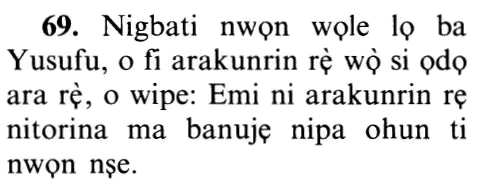12vs69
Select any filter and click on Go! to see results
وَلَمَّا دَخَلُواْ عَلَى يُوسُفَ آوَى إِلَيْهِ أَخَاهُ قَالَ إِنِّي أَنَاْ أَخُوكَ فَلاَ تَبْتَئِسْ بِمَا كَانُواْ يَعْمَلُونَ
Walamma dakhaloo AAala yoosufa awa ilayhi akhahu qala innee ana akhooka fala tabtais bima kanoo yaAAmaloona
Index Terms
Click to play
Yoruba Translation

Hausa Translation
Kuma a lõkacin da suka shiga wajen Yũsufu, ya tattara ɗan´uwansa zuwa gare shi, ya ce: "Lalle nĩ ne ɗan´uwanka, sabõda haka kada ka yi baƙin ciki da abin da suka kasance sunã aikatãwa."
Asbabu n-Nuzuul (Occasions of Revelation)
Yusuf comforts Binyamin
Allah tells:
وَلَمَّا دَخَلُواْ عَلَى يُوسُفَ آوَى إِلَيْهِ أَخَاهُ قَالَ إِنِّي أَنَاْ أَخُوكَ فَلاَ تَبْتَئِسْ بِمَا كَانُواْ يَعْمَلُونَ ﴿٦٩﴾
And when they went in before Yusuf, he took his brother (Binyamin) to himself and said: "Verily, I am your brother, so grieve not for what they used to do.''
Allah states that when Yusuf's brothers went in before him along with his full brother Binyamin, he invited them to a place of honor as privileged guests. He granted them gifts and generous hospitality and kindness. He met his brother in confidence and told him the story of what happened to him and that he was in fact his brother. He said to him, لاَ تَبْتَئِسْ `(grieve not) nor feel sad for what they did to me.'
He ordered Binyamin to hide the news from them and to refrain from telling them that the Aziz is his brother Yusuf. He plotted with him to keep him in Egypt enjoying honor and great hospitality.
يخبر تعالى عن إخوة يوسف لما قدموا على يوسف ومعهم أخوه شقيقه بنيامين وأدخلهم دار كرامته ومنزل ضيافته وأفاض عليهم الصلة والألطاف والإحسان واختلى بأخيه فأطلعه على شأنه وما جرى له وعرفه أنه أخوه وقال له لا تبتئس أي لا تأسف على ما صنعوا بي وأمره بكتمان ذلك عنه وأن لا يطلعهم على ما أطلعه عليه من أنه أخوه وتواطأ معه أنه سيحتال على أن يبقيه عنده معززا مكرما معظما .
"ولما دخلوا على يوسف آوى" ضم "إليه أخاه قال إني أنا أخوك فلا تبتئس" تحزن "بما كانوا يعملون" من الحسد لنا وأمره أن لا يخبرهم وتواطأ معه على أنه سيحتال على أن يبقيه عنده
قال قتادة : ضمه إليه , وأنزله معه . وقيل : أمر أن ينزل كل اثنين في منزل , فبقي أخوه منفردا فضمه إليه وقال : أشفقت عليه من الوحدة ,
I'raab - grammatical analysis of the Qur'an
«وَلَمَّا» الواو عاطفة ولما ظرف زمان.
«دَخَلُوا» ماض وفاعله وجملة دخلوا في محل جر مضاف إليه.
«عَلى يُوسُفَ» متعلقان بدخلوا.
«آوى » ماض مبني على الفتح المقدر على الألف للتعذر والفاعل مستتر والجملة لا محل لها.
«إِلَيْهِ» متعلقان بآوى.
«أَخاهُ» مفعول به منصوب بالألف لأنّه من الأسماء الخمسة والهاء مضاف إليه.
«قالَ» الجملة استئنافية.
«إِنِّي» إن واسمها.
«أَنَا» مبتدأ.
«أَخُوكَ» خبر مرفوع بالواو لأنه من الأسماء الخمسة والكاف مضاف إليه والجملة خبر إن وجملة إن واسمها وخبرها مفعول به لقال.
«فَلا» الفاء الفصيحة.
«لا» ناهية.
«تَبْتَئِسْ» مضارع مجزوم بلا والجملة لا محل لها لأنها جواب شرط غير جازم.
«بِما» الباء جارة وما موصولية وهما متعلقان بتبتئس.
«كانُوا» كان واسمها والجملة صلة لا محل لها.
«يَعْمَلُونَ» مضارع مرفوع بثبوت النون والجملة خبر كان.
